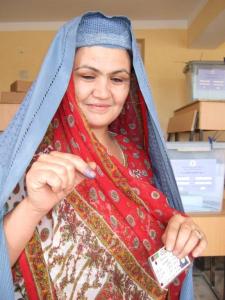
Parliamentary Elections in Kabul, September 2010 © Fahimeh Robiolle
Afghans are getting ready to vote for their next president in a few hours. As David Loyn (BBC) reports, the Afghan election will see “the biggest security operation mounted in Afghanistan since the fall of the Taliban in 2001.” The results of this election will be highly scrutinized and the international community is wondering if Afghanistan can hold a credible election… While there is a widespread concern about ballot stuffing, serious efforts have been invested in ensuring that attempts to rig the poll will fail. The Taliban have vowed to disrupt the vote and there were a string of attacks leading up to it, but security at this election will be tighter than in previous votes. Media reports suggest that the majority of the people in Afghanistan are looking forward to casting their votes despite threats of terror attacks.
In this climate of uncertainty, International Rescue Committee (IRC) calls for urgent humanitarian and development aid investment to ‘protect fragile gains’ in Afghanistan. Its latest report, What Next for Afghanistan?, warns against fatal drift in 2014. It draws on more than 25 years of experience of operating in Afghan communities and surveyed over a hundred Afghan members of IRC staff.
Against a backdrop of deep aid cuts and wavering commitments from donors, the report makes specific recommendations to improve the delivery of aid to protect and build on the fragile gains of the last decade – from education to health care to other essential community-based services.
David Miliband, president and CEO of the IRC, said, “It is extraordinary that just 0.025 per cent of the estimated cost of military operations in Afghanistan could provide critical assistance for 5 million Afghans this year.* [UK figure is 1.75 percent of UK military spending over ten years.] We can’t afford to lose the fragile gains of the last decade and we don’t have to.”
He also adds that “conflict has torn at the fabric of Afghanistan for generations and a great deal of blood and treasure has been spent in the last decade. What we need now is urgent and sustainable investment to support the Afghans in securing their own future. Despite real security concerns the international community must not turn its back on the Afghan people. The end of international military operations in Afghanistan is the time to redouble humanitarian efforts, not scale them back.”
The report calls on the international community to stand beside the Afghan people as international troops leave the country:
- Five million Afghans need lifesaving support, such as food and emergency medical care,
- 4 million have chronic longer terms needs, including safety from conflict, regular employment and access to health care,
- 650,000 Afghans are displaced within the country and an additional 2.5 million are living as refugees in neighboring countries, unable to return home.
The IRC report details specific recommendations, urging the international community to:
- Make a long-term commitment to the people of Afghanistan.
- Support millions in need by making high-return investments at the local level with effective community-based programs.
- Break the cycle of displacement through refuge, resettlement and asylum for vulnerable Afghans who cannot yet safely return home, and target those who have returned with concentrated support.
- Respond quickly to lifesaving humanitarian and life-building development needs.
- Use limited resources effectively. Aid agencies must coordinate and share information so that assistance reaches all in need.
- Create a plan to align humanitarian and development response by listening to the needs of the people and draw on existing frameworks to create a comprehensive plan.
These recommendations were developed with and are supported by the IRC’s Afghanistan Taskforce: Madeleine Albright, Sir John Holmes, M. Farooq Kathwari, Kathleen Newland, Milbrey Rennie, Gideon Rose, Maureen White, and James Wolfensohn.
Read the full report ‘What Next For Afghanistan’ here.
* Total US financial costs of $1.6 trillion over 12 years is an estimate from the Watson Institute for International Studies at Brown University. The UN-OCHA-led humanitarian community is seeking $406 million through the Common Humanitarian Action Plan to provide the 5 million most vulnerable Afghans with lifesaving assistance in 2014. The sum $406 million is 0.025 per cent of $1.6 trillion. The UK Parliament Defence Committee’s 4th report estimated operations in Afghanistan cost the military £14 billion over ten years. The sum $406 million is 1.75 per cent of £14 billion at current exchange rates.Source: BBC, International Rescue Committee
